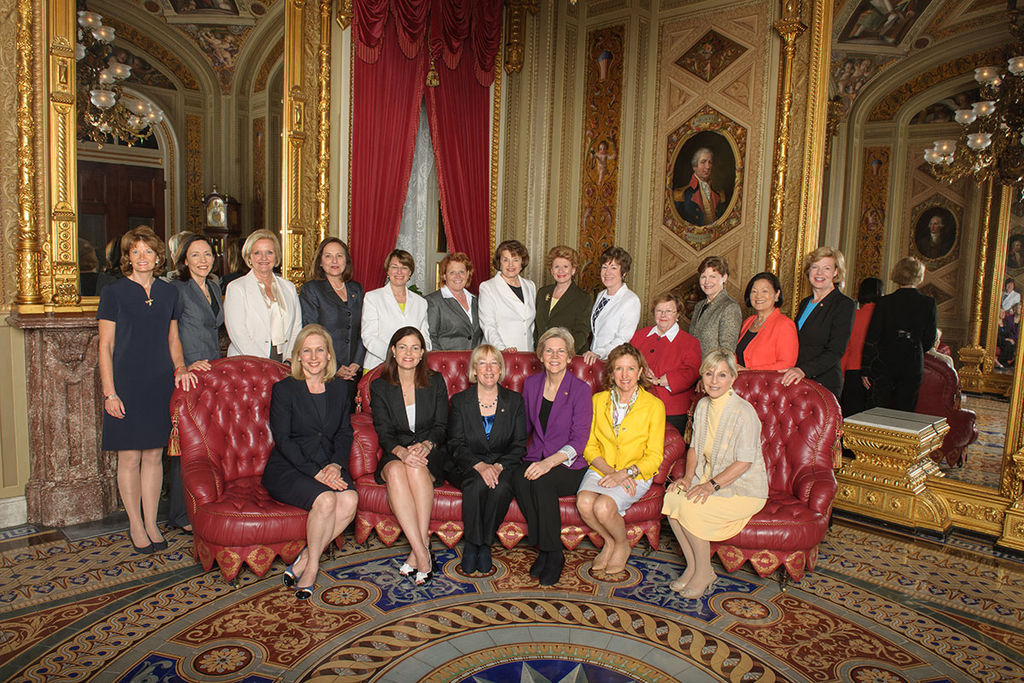Women presidential candidates are appearing in unprecedented numbers for the 2020 election. So far, Elizabeth Warren, Kamala Harris, Kirsten Gillibrand, and Tulsi Gabbard have announced their intentions to run. This surge corresponds to the 2018 midterm elections, which also saw record numbers of women obtaining seats previously held by men. In the wake of the 2016 election, when the presidential confirmation of a Donald Trump won the day over an eminently qualified female candidate, it seems that more women are ready to run and more people are eager to elect them.
From the stoic prudence of Angela Merkel to the fallen humanitarian Aung San Suu Kyi, it is clear that women are as capable and complex as their male peers in positions of leadership. Women are leaders around the world, though recently they constituted only 6 percent of international leaders compared to male heads of state.
American voters believe women score equally or higher than men in terms of valued leadership qualities, but women still lag behind men in positions of power, including their most glaring omission in the role of the US presidency.
Reactionary streams in American politics likely bear some role in women’s lagging parity. The most recent iterations include the conservatism of the neo-Nazi movement espoused by Richard Spencer, the unlikely stardom of Jordan Peterson, purveyor of 19th century psycho-social truisms presented as original contrarian theories, and the backlash to the #MeToo movement among Republican leadership exemplified in the appointment of Brett Kavanaugh to the Supreme Court after his histrionic confirmation hearing.
At the same time, these reactions to change suggest that unparalleled changes are occurring. Among them is a redefinition of character norms.
Our very notion of “virtue,” a core term in philosophical discussions about character, has gendered connotations. The word “virtue” in English derives from the Latin word for “manliness.” While the ancient Greek term for virtue is gender-neutral, i.e. excellence (arete), Aristotle’s Nicomachean Ethics treats personal greatness as the birthright of a very few men. Aristotle speaks of courage and justice, but also liberality and magnanimity, character traits which reflect a superior social standing. Aristotle, like so many of his successors, demarcated virtue and public life as the space for the few males who belonged to an emancipated, land-owning, citizen class. This separation was made possible by setting aside manual and household labor or “economy” – literally, household management, as the province of women, slaves, and the non-citizen class of men. It was this vast majority’s task to create value which would accrue to the men in charge. It is thus no surprise that “magnanimity” or “greatness of soul” (characterized by a sense of entitlement) also figures largely among Aristotle’s virtues.
Because women, slaves, and non-citizen men performed the labors of life, Hellenistic aristocratic men enjoyed leisure or “paideia,” which permitted education and a public life that are essential for political participation. This primary division of labor and leisure justified an oligarchic and patriarchal logic: might equals right. This is the circular logic of power: those who are in power must have managed it by being somehow superior (an argument Aristotle makes in his Politics) or conversely, those who are in power determine the rules because they can enforce them. The latter is put forward by Plato’s Thrasymachus in the Republic (Thrasymachus, incidentally, may be one of the most socially-realist characters in early philosophical literature). This ancient rationalization of “might equals right” has enjoyed a surprisingly long shelf life. America’s founding fathers similarly opted for a “republic” rather than a democracy, ensuring that only a very few, adult, European-descended, property-owning men could vote. Even today, the fundamental logics of white supremacy and extreme capitalism can be parsed in very similar lines.
Given that women, persons of color, and LGTBQ individuals have been running for office in record numbers since Trump, it will be interesting to see the kind of politics that arises from communities that are not accustomed to power and representation as their birthright. Figures like Elizabeth Warren, Kamala Harris, and the Congresswoman Alexandria Ocasio-Cortez suggest visions for a more inclusive distribution of power, labor, representation and compensation. In the long, painful stages of late capitalism where a middle class has all but disappeared, and the majority of Americans are carrying most of the burdens of contemporary life while only a very few enjoy its rewards, it seems that voters are ripe for a new kind of politics.
Women, Representation, Revolution
This article has a set of discussion questions tailored for classroom use. Click here to download them. To see a full list of articles with discussion questions and other resources, visit our “Educational Resources” page.
As the midterm election rapidly approaches, one thing is obvious—the number of women running for office is truly historic. There are 256 women running for Congress, 234 for seats in the House and 22 for seats in the Senate. The majority of the women running are Democrats. There are 197 Democratic female candidates and 59 Republican female candidates. The previous record for Democratic female nominees to the House was established in 2016, when 120 women were nominated, a record that is shattered by this year’s numbers. Historically, women have never comprised more than one-fourth of the House or the Senate. This year, that might change.
With the possibility of more female governance on the horizon, it seems like a good time to reflect on what this might mean for the country in both the short and the long term. One of the more immediate results of having more women in power might have been one of the main motivators for women to run for office in record numbers this year in the first place: a change in tone with respect to how women’s issues are discussed. To many, it seems as if there are no real consequences when it is revealed that important public officials discuss and treat women in demeaning, objectifying ways. If more women are in position to write and edit the script when it comes to how public officials talk about and treat women, we might be looking at a new normal.
If there were more women in power, it would make a tremendous difference when it comes to the habituation of children. Female children would be put in a position to see a new range of possibilities for themselves. If these female candidates are successful, becoming a politician might seem like a natural career choice for a young woman dreaming about her future. Male children being raised in a society with more female representation will never be led to believe that political power is held predominantly by men in the first place. A choice to become a politician will seem equally possible for young men, and they’ll be ready to come to the decision-making table and roll up their sleeves with both men and women.
If there were more women in power, decisions about women’s issues could be made with the benefit of the crucial female voice. Of course, not all women share the same opinions, but discussion generated by healthy disagreement among women with different backgrounds and experiences with women’s issues is crucial to constructing sound policy and legislation in these areas.
Of course, it’s not as if the dominant reason for electing women is so that they can have a say when it comes to issues that affect women. That women should be involved in discussion about women’s issues is a pretty minimum requirement for just, fair governance. A female perspective is crucial when it comes to all social policy.
It might be time for a revolution when it comes to our philosophy of power. There are different approaches to power, each of which might be appropriate in different domains and which may work together to regulate one another. We know that women provide the majority of both paid and non-paid care work. In our current political climate, that work is significantly undervalued. What if we came to recognize the value of care—and saw it for the tremendous source of power that it ought, rightly, to be? This kind of power is not a power over, but a power to, specifically, a power to help. A care relationship arises out of need. For example, a child may have needs for food, clean drinking water, and shelter, among other things. Parents, in their capacity as caregivers, have the power to help to satisfy those needs.
What if the popular understanding of the relationship between representative and constituent changed? Currently, we tend to have a pretty paternalistic conception of the way that political representation works. People vote along party lines and then largely check-out, trusting the elected official to make decisions in ways that are consistent with their values. Politicians, on this model, are given wide berth to engage in dubious political machinations and place themselves in the pockets of lobbyists. But care relationships don’t work this way. What would change if we came to view the relationship between the representative and the constituent as a relationship of care, where the power wielded by politicians was the power to help? Care depends on need, and addressing needs requires paying attention. So a politician fails to satisfy their obligation of care when, for example, they fail to respond to constituents who overwhelmingly express a need for change in firearm legislation. The representative would retain some autonomy and authority over the precise way in which this need gets pursued, but they can’t just ignore it altogether. If a child expressed an urgent and legitimate need for medical care, we’d view a parent as negligent if they didn’t attempt to satisfy that need to the extent that they were able. Should we respond any differently when it is our fellow citizens drowning themselves in debt to pay for essential medical needs while our representatives look on, unresponsive?
People have different personalities and interests and express power in various ways, irrespective of gender. We’ll avoid generalizing. But if, as the numbers bear out, women often voluntarily engage in care work regularly in an earnest desire to help, this new way of conceiving of power results in the conclusion that many women would be quite well-suited to take on the political mantle. In many of the locations in which women are running this year, they have little chance of being successful. But some races look promising. It’s a start.


